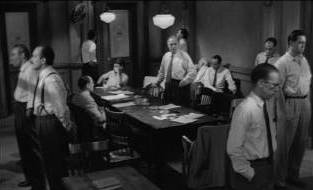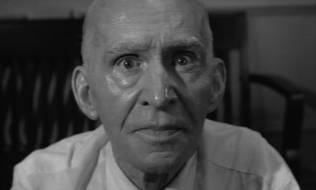12 Angry Men (Sidney Lumet, 1957)
Sidney Lumet’s 12 Angry Men is a permanent trace of an impermanent form: the live television anthology show. In the early fifties, the US networks produced several anthology programs in which new original dramatic plays would be performed live to air. By their nature these programs were destined to fade from memory: the form had been replaced by more conventional filmed (ie not live) dramas by the end of the fifties, and few of the programs were preserved. Yet they retain a fascination for those, like myself, who never saw them. Live anthology programs challenge the post-fifties conception of what the television medium is about: instead of being a poor cousin of cinema (which, despite all the great TV out there, is what I think most of us still subconsciously accept TV as), these shows took much of the best of live theatre and cinema to create a unique hybrid medium. The anthology shows attracted talented writers and created genuinely prestige programs. The Best Picture winner for 1956, Marty, was based on a Paddy Chayefsky-scripted episode of Philco’s Television Playhouse, while 12 Angry Men, an adaptation of a 1954 episode of Studio One, was nominated for the same award in 1958. Try to imagine an episode from even the best of today’s television shows being adapted into an Oscar winning film only a few years after airing on television and you’ll have an idea of how far TV has fallen in the cultural stakes. No wonder Hollywood feared it.
Sidney Lumet’s adaptation of 12 Angry Men remains potent nearly fifty years later. Reginald Rose’s screenplay (he also wrote the original show) is a masterpiece of intense focus. Unfolding almost entirely within a jury room and its attached bathroom, it follows the tense deliberations of a jury considering an apparently open and shut case. A Puerto Rican teenager is accused of killing his father. Two witnesses place him at the scene, and one says she saw the killing. Eleven of the twelve jurors immediately vote guilty, but one (Henry Fonda) believes they owe it to the boy to at least deliberate on the possibilities. The film explores the fallout and personality conflicts that erupt as the men attempt to break the deadlock. The success of such a constrained scenario is dependent upon top-notch contributions across the board, and the film has an unusually fine cast. In addition to Fonda, the jurors are played by:
- Martin Balsam, as the foreman who is preoccupied with proper process
- John Fiedler, as the softly spoken nerd
- Lee J. Cobb, as the highly aggressive proponent of a guilty verdict
- E.G. Marshall, as the self-styled voice of reason
- Jack Klugman, as the gentle former slum kid
- Jack Warden, as the brash baseball fan who just wants to get to the game
- Joseph Sweeney, as the old man who wants to hear Fonda out
- Ed Begley, as the bigot
- George Voskovec, as the immigrant who appreciates democracy more than the American-born citizens do
- Robert Webber, as the brash but shallow ad man; and
- Edward Binns, as the nondescript everyman.
All are excellent, as they show how one by one the jurors come to vote not guilty.
Rose’s script is an extraordinary piece of writing, arguably one of the finest screenplays ever written. I make that grand claim because of how well it performs at multiple levels, despite the constrained premise. It is an extremely well realised whodunnit, with the deductive reasoning of Fonda and the other jurors gradually chipping away the prosecution case. It is a taut thriller, ratcheting up the tension in the room in small increments so that the passion of the final confrontations remains believable. It is an absorbing character study: while a film with this scenario must lean slightly on caricature to allow vivid and distinct characters to emerge, Rose complicates these archetypes to add depth to the personalities. For example, the slum kid (Klugman) is the meekest in the room; the nerd is highly assertive at several critical points; and the advertising man is particularly limited and uncreative in his thinking. Even Fonda’s character, a man of almost saintly qualities, comes across as unreasonable and out of his depth in some of the early scenes, as he is asked how the boy could possibly be innocent and can only respond somewhat desperately, over and over, “It’s possible!” The film is, finally, an effective and thought provoking civics lesson, with applicability not only to the legal system, but to any example of group behaviour. I often think of this film when the media reports on crimes and suggests a particular version of the truth: it’s a telling example of the way that the most obvious interpretation of the facts can be questioned with a closer look.
Given the film’s emphasis on dialogue, it is tempting to downplay the role of Lumet’s direction, or to praise him purely for his handling of the actors. While it is true that Lumet deserves praise for his role in guiding the cast (twelve excellent performances in one film cannot be a mere coincidence), his direction goes much beyond that. There is a common misconception that there is something intrinsically wrong with a film that is based on a play (or, in this case, live television play) that does not “open up” the material. (How often have you seen a critic complain that a film belied its stage origins?) While it is true that some films try to expand the scope of a play beyond the minimal settings of the theatrical original and do so awkwardly, 12 Angry Men shows that any talk of what is intrinsically suited to the medium needs to be treated with caution. One of the strengths of cinema as a medium is its ability to do many different things – to argue that a film should not be confined to a single setting or driven by dialogue because it is “uncinematic” is to underestimate the versatility of the form. 12 Angry Men eschews notions of what a film “should” do, defiantly keeping the single-room setting of the original (the scenes outside the jury room at start and finish are mere window dressing). In doing so, it shows that a skilful director can match the intensity of a live theatrical performance.
Indeed, some of Lumet’s most self-consciously “cinematic” moments are actually my least favourite moments in the film. For example, one of the signature moments late in the film has Begley berating the others for their views, only for his rantings to reveal his own bigotry. As he talks, the jurors get up from the table and turn their backs on him in silent rejection. The whole speech is done in one take, starting in close-up, passing over a seat vacated by Begley’s character in the preceding moments, and finally encompassing the entire room (above left). It’s a cleverly staged scene, well performed, choreographed, and shot, but its showiness is distracting and detracts from the realism of the drama. This is a momentary lapse, however, and generally Lumet’s instincts are much surer. A much better example of Lumet’s film sense is earlier on, when Fonda stakes everything on a single silent ballot, and says he’ll vote guilty if it’s still eleven to one. It’s one of the film’s tensest moments, as Balsam opens up each sheet in turn and eventually comes across one other guilty vote. Arguments break out, with Cobb accusing Klugman of switching his vote out of ethnic loyalty, only for Joseph Sweeney’s old man to volunteer that it was he who changed his vote. His interjection is the critical turning point in the early part of the film, and Lumet interrupts a series of fluid, unselfconscious medium shots with a very dramatic, almost distorted close-up of Sweeney (above right). It’s a great piece of direction, showing the power of editing and camerawork to really make a moment. This was Lumet’s first film after directing television plays for several years, and this moment shows how sure his feel for cinema already was.
While the film’s politics are obviously left / liberal leaning, I think it is arguable as to exactly how positive a view it takes of the legal system and society generally. Danny Peary, writing in his book Guide for the Film Fanatic, thinks it’s open and shut, describing the film as “idealistic” and stating that: “Rose’s belief (his faith in the jury system) is that a group of diverse Americans will make the right decision because those who are biased will be outnumbered.” It’s true that some moments show great faith in people, such as the aforementioned scene where the bigot, once flushed out, can find no support for his views. Yet for all the wisdom and nobility of the Fonda character, there’s no getting away from the depressing fact that if he had not been on the jury, the accused would certainly have been found guilty. The film depicts most of the jurors as decent and intelligent (only Cobb, Begley and Warden are really dislikable or overtly irresponsible in performing their duty), yet they are still unwilling to see reasonable doubt in the case until Fonda goes to extraordinary lengths to persuade them. And given that none of the points Fonda raised have come out during the trial, it is clear that the legal system has failed in this case. One of the first scenes in the film shows the judge admonishing the jury as to their responsibility: his whole tone is disconnected and uncaring, suggesting that those who administer the law have become jaded and complacent. The film is therefore a powerful argument against the death sentence, but it is also a call to arms for those who value civil rights. It shows that those who want true justice cannot leave it to either the system or the mob: they will get it wrong unless a brave few stand up and make themselves heard.


